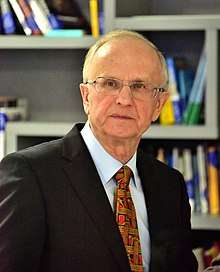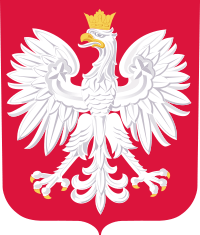Grzegorz Kołodko
Grzegorz Witold Kołodko (pronounced [ˈɡʐɛɡɔʂ kɔˈwɔtkɔ]; born 28 January 1949 in Tczew, Poland) is a distinguished professor of economics. A key architect of Polish economic reforms. He is the author of New Pragmatism original paradigmatic and heterodox theory of economics. University lecturer, researcher, the author of numerous academic books and research papers. As Polish Deputy Premier and Minister of Finance in 2002-03 he played a leading role in achieving the entry of Poland into the European Union. Holding the same position in 1994-97, Kolodko led Poland to the OECD. The founder and Director of TIGER – Transformation, Integration and Globalization Economic Research at the Kozminski University in Warsaw. Consultant to such international organizations as the IMF, World Bank, UN, and the OECD. Member of the European Academy of Arts, Sciences and Humanities, Member of Academia Europaea. Foreign Member of Russian Academy of Sciences. Honorary Chairman of China's Public Diplomacy Institute and a Non-resident Senior Fellow, Chongyang Institute for Financial Studies, Renmin University of China, Beijing, Professor HUST, Huangzhou University of Science and Technology, Wuhan; Distinguished Professor of Emerging Markets Institute, Beijing Normal University, Beijing.
Grzegorz Witold Kołodko | |
|---|---|
 | |
| Finance Minister of Poland | |
| In office 28 April 1994 – 4 February 1997 | |
| President | Lech Wałęsa, Aleksander Kwaśniewski |
| Prime Minister | Waldemar Pawlak, Józef Oleksy, Włodzimierz Cimoszewicz |
| Preceded by | Henryk Chmielak (acting) |
| Succeeded by | Marek Belka |
| Finance Minister of Poland | |
| In office 6 July 2002 – 16 June 2003 | |
| President | Aleksander Kwaśniewski |
| Prime Minister | Leszek Miller |
| Preceded by | Marek Belka |
| Succeeded by | Andrzej Raczko |
| Personal details | |
| Born | 28 January 1949 Tczew, People's Republic of Poland |
| Profession | Economist |
Biography
After graduating from Warsaw School of Economics in 1972 and gaining his Ph.D. in 1976 he lectured at the same university and was appointed to a Chair in Economics in 1984. In 1985-86 he was Senior Fulbright Fellow at the University of Illinois in Urbana-Champaign. In 1982-88 Advisor to the Governor of National Bank of Poland. Participant in the historic ‘Round Table’ negotiations in 1989, which led to the first post-communist government in Eastern Europe. He was a Member of the Economic Council of the Polish Government in 1989-91.
Research Fellow at the United Nations World Institute for Development Economics Research (WIDER) in Helsinki in 1988, 1989, and 2002. In 1989-94 Director of the Institute of Finance, Warsaw. He was consultant to the International Monetary Fund Research Department in 1991 and 2000, and to the Fiscal Policy Department in 1992 and 1999. In 1994 Senior Research Fellow at the Institute of Finance and Monetary Policy in Tokyo. In 1997-98 was appointed to the Sasakawa Chair and Distinguished Research Professor in Development Policy at WIDER. In 1998 Visiting Fellow at the World Bank and Senior Research Fellow at Yale University.
He is the author and editor of 50 books and over 400 articles and research papers, published in 26 languages, much in English (http://www.tiger.edu.pl/english/kolodko/publikacje.htm). Recent books in English include: "Whither the World: The Political Economy of the Future", Palgrave Macmillan, Houndmills, Basingstoke, Hampshire 2014, „Truth, Errors and Lies. Politics and Economics in a Volatile World”, Columbia University Press 2011 (published also in 10 other languages), „20 years of transformation. Achievements – Problems – Perspectives” (co-author and editor), Nova Science 2011; “Transition and Beyond”, Palgrave Macmillan 2007 (co-author and editor); “The World Economy and Great Post-Communist Change”, Nova Science 2006; “The Polish Miracle. Lessons for the Emerging Markets”, Ashgate 2005 (co-author and editor); “Globalization and Social Stress”, Nova Science 2005 (co-author and editor); “Emerging Market Economies. Globalization and Development”, Ashgate 2003 (co-author and editor); “Globalization and Catching-up in Transition Economies”, University of Rochester Press 2002 (published also in 11 other languages); “From Shock to Therapy. The Political Economy of Postsocialist Transformation”, Oxford University Press 2000 (published also in Chinese, Russian, Ukrainian, Japanese, and Polish); “Post-Communist Transition: The Thorny Road”, University of Rochester Press 2000.
He has held courses and seminars in political economy, economic policy, comparative economics, development policy, public finance, and economics and politics of post-communist transformation at the Warsaw School of Economics (SGPiS/SGH), and at Kozminski University, as well as at several other universities, particularly in the United States of America – Yale, UCLA, the University of Illinois, Wesleyan University, the University of Rochester, NY – and has led various research projects, and lectured, in a number of foreign institutes and universities, on all continents, throughout the world.
Awards
Winner of numerous prizes and awards for research and teaching activities. He was awarded Doctor Honoris Causa by Lviv University in 2003, South West University of Finance and Economics in Chengdu, China (SWUFE) in 2004, Finance University in Moscow in 2009, University of Debrecen, Hungary, in 2009, the International Institute of Management, MIM, in Kiev, Ukraine, in 2014, and Corvinus University in Budapest in 2019, and has received the Honorary Professorships from India Institute of Finance, New Delhi, in 2004, from Nankai University, Tianjin, China, in 2004, from Moscow Academy of Economics and Law in 2005, the Alfred Nobel University in Dnepropetrowsk, Ukraine, in 2014. In 1996 nominated by Euromoney the Best Minister of Finance in East Central Europe. For his outstanding achievements in managing transformation and development policy, in 1997 awarded the prestigious Comandoria Restituta Medal by the President of Poland.
See also
External links
| Wikimedia Commons has media related to Grzegorz Kołodko. |
